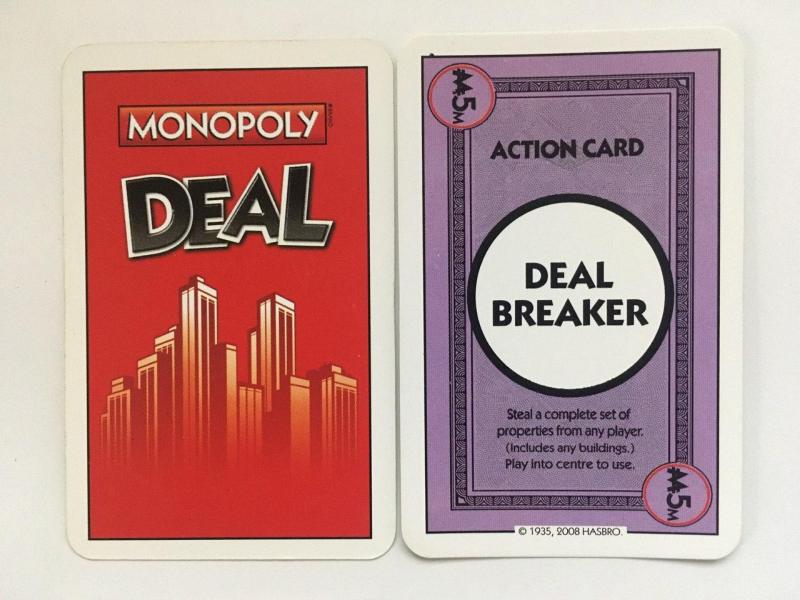The game breaking Deal Breaker card ⚓
24 Jun 2020I have a presentation I sometimes give about Monopoly being a terrible game1. I usually end it by pointing the audience to Monopoly Deal, which I introduce it as “the only Monopoly edition you can enjoy”.
The advantages are obvious:
- Much shorter game length.
- No dice rolls.
Even if you lose badly on luck, you’ve only lost 15 minutes. While it is better than Monopoly, that isn’t to say it is a well designed game (6.3 on BoardGameGeek).
The one major dent in the otherwise decent game is the “Deal Breaker” card, which breaks the game. I’ve house-ruled the game since forever to keep the card out of the game, since it breaks the most important rule of game design:
Games should be fun2
Deal Breaker stops people from doing that. How? Read on.

A lot of metagaming discussion with friends resulted in the following observations:
- The Deal Breaker is a very powerful card (It takes you 1/3rd of the way to a victory).
- You can assume the single Deal Breaker card to be worth a complete set.
- The best use of such a card is to win the game. Using it earlier means giving other players a chance to drag you down from 2->1 set. But if you use it to win the game, the game ends immediately.
- Hence, Deal Breaker will always end up being the last card of the game.
If you are playing a game with the Deal Breaker card, you’d want to save it till the very end, and win the game with it. The only possible case for not winning is the other player having a “Just Say No” card, and playing it on the Deal Breaker to negate your move.
Ergo, the metagame converges to the following:
- Any game with Deal Breaker will end up having the Deal Breaker as the last turn.
- The only way to prevent someone else from winning with the Deal Breaker is to play a Just Say No on the Deal Breaker.
- If you have a Just Say No card, you must save it till the end of the game for the Deal Breaker.
There are 2 Deal Breakers, and 3 Just Say Nos in the game. However, considering a single Deal Breaker is enough to win the game, and the chances of you getting a second of either card are fairly small - both the Deal Breaker and Just Say No cards will end up getting hoarded for the endgame.
What this results in is something that breaks the fundamental rule of game design:
Players are disincentivized from playing the Just Say No card.
As any Exploding Kittens player can confirm, playing a Just Say No card is one of the coolest moves in the game. It lets you stick it to the player who dares ask you for 8M3 rent. It lets you pretend you’re counting your money, and then pull out a trump card and feel awesome! By disincentivizing players from playing the coolest card in the game, the Deal Breaker card makes things less fun. And that breaks our “rule of fun”.
In fact, the mere existence of a Deal Breaker card changes the equation. Note that there may be cases where you lose with a Just Say No card because you were hoarding it for the eventual Deal Breaker (which might never come). Someone asks you for 4M rent, and you have to pay up despite having a Just Say No card, because you must save the damn card for when someone steals your set. There are a few rare exceptions, but the Deal Breaker creates too many plays where not playing the Just Say No is indeed the correct move.
So here is the more interesting corollary observation:
The mere existence of the Deal Breaker card breaks the game by making the Just Say No card unplayable and worthless.4
Hence, if you’re playing Monopoly Deal, please house-rule the Deal Breaker card and make it easier for everyone. Two easy ways are:
- Remove the card from the game entirely.
- Reduce the power of the game to be same as a Forced Deal, except let it break a set.
-
I have the slides here, but they don’t stand well on their own. ↩
-
Any game that eliminates players from the game breaks this rule. Popular examples are Monopoly and Mafia/Werewolf. Also see this amazing post on the biggest mistake that Guillotine makes (The “Callous Guard” card). ↩
-
Turns out, that there is no symbol in the unicode for Monopoly Money ↩
-
We decided Deal Breaker might make sense in 6+ player games with many more cards, where it might help even the playing grounds a bit for a losing player (much more likely) instead of helping the almost-winning-player score a victory. ↩
Published on June 24, 2020
